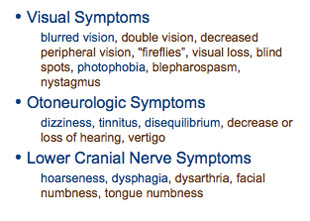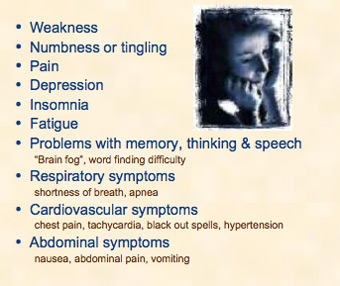
Figure 13
Again, by coughing my brain is going to expand because of the increased venous blood that’s in there so it’s going to quickly get a little larger, and water’s incompressible. So water has to go somewhere. It’s going to run up against the skull so it can only go one way for the most part, it goes down. And if the brain is moving down that way to block off all the outflow, all of a sudden that extra spinal fluid is going to be retained in the head. If you have a cisterna magna and you do that, fine– brain will expand, spinal fluid goes down into the spinal canal. The spinal canal, because it has a lot of veins on the outside and can actually expand a little bit, takes off the pressure like a relief valve and people without Chiari won’t notice much with a cough or a sneeze or a strain. So that’s the difference. But again, there’s a lot happening in this area and so we can see a variety of other symptoms. [see Figure 13] Visual symptoms are very common, in our case, blurred vision and photophobia, which means they don’t like bright lights. Hearing symptoms, dizziness, vertigo, balance, problems with the nerves at the very bottom, hoarseness, difficulty swallowing and a whole list. [see Figure 14]

Figure 14
Weaknesses: the tracts are affected going down into the arms and legs. As the sensory tracts going up are affected, numbness and tingling can occur. There can be pain because that dura, the membrane around that area, has pain fibers in it. Then there are a variety of things that are associated with other disorders as well, certainly, as you can see here. [see Figure 15]
Fatigue is not unusual in this condition. Problems with memory and thinking: when we started hearing the term brain fog, I sort of discounted that thinking, how can that area be involved with memory and thinking? But indeed it’s not uncommon for people to describe difficulty in thought processes. I had a man who was sick and had repetitive bouts of coughing. After a spell of coughing he felt he had to get his thoughts back out through that fog, his thoughts were just not quite there. I visited with a neuropyschiatrist in the Denver area who tells me in their field the cognitive role of the cerebellum is being increasing looked at. In other words we used to just view the cerebellum as a coordination organ, if you will, but it may have a little more to do with some general cognitive function, although again that’s very preliminary and I hesitate to emphasize that too strongly.


